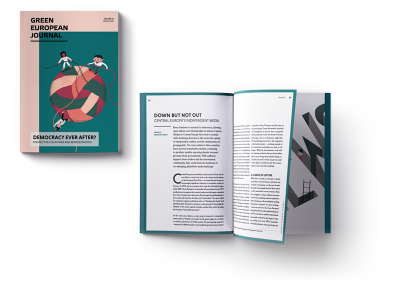This article is part of a panorama in which eight analysts from around Europe look at how referendums are used or misused, and how they shape public debate. The series explores the role of referendums throughout Europe: how they drive change, whether progressive or reactionary, and foster common understandings crucial for functioning democracies.
On 23 June 2016, the European Union faced its greatest challenge, as the citizens of the United Kingdom went to the polls to vote in a referendum on EU membership. Facing a binary question of leave or remain, 51.9 per cent of those who voted indicated a desire to end the relationship with the EU – a move hailed as a triumph of democracy by those who had pushed for leave. But was this accurate?
Referendums are a very un-British political mechanism. The UK takes great pride in its status as the “mother of parliaments”, rooted in its long tradition of representative democracy and parliamentary sovereignty. Including the Brexit vote, only three referendums have ever been held on a UK-wide basis, all non-binding in nature. The tool has been used slightly more widely in regard to the UK’s constituent nations (most notably the 2014 referendum on Scottish independence) and local issues. In principle, however, they have been viewed not only as unsuitable for the British system, but indeed dangerous – with Margaret Thatcher famously describing referendums as “a device of dictators and demagogues”, echoing the words of wartime Deputy Prime Minister Clement Attlee.
Referendums have been viewed not only as unsuitable for the British system, but indeed dangerous.
Yet, despite this traditional hostility, in recent years their use has picked up greater political drive. There appear to be three elements behind this. First, the use of a referendum to answer a significant constitutional question, principally around the future of the United Kingdom itself. As support for Scottish independence has surged during the pandemic (and following Scotland’s strong vote against leaving the EU), so too have calls for a second referendum on Scotland’s constitutional future. A referendum requires the support of the UK Government, backing that Prime Minister Boris Johnson has pledged to withhold, leaving the debate fractious and unclear. The 2014 independence referendum was framed by the Edinburgh Agreement, whereby the UK and Scottish Governments pledged to abide by the outcome. The absence of a second agreement would leave the Scottish Parliament having to consider whether to hold a referendum without a legal basis, with all the challenges that brings, as witnessed in Catalonia and elsewhere.

The second trend regarding referendums in Britain has been their use as a means to gain legitimacy and solve other political problems. The EU referendum took place because David Cameron, the Conservative prime minister at the time, was looking to stave off revolt from his party’s fractious pro-Brexit arm. Although Britain’s EU membership had been a long-term question, withdrawal did not appear to have significant public traction. The hope from Cameron and his team appeared to be that a referendum could defuse their challenges, without really needing to deliver on it. That gamble turned out to be wildly unsuccessful.
Given the lack of historical precedent, referendums are not an approach embedded in the UK’s civic or political thinking and culture.
Finally, there has been clever use of the mechanism by those seeking to bring about seismic change. A binary referendum such as Brexit or Scottish independence reduces highly complex and nuanced decisions to an either/or choice. Given the lack of historical precedent, referendums are not an approach embedded in the UK’s civic or political thinking and culture. Both referendums saw campaigns (both for and against) use fear tactics, misinformation, and reductive rhetoric to avoid the complexity of the issues at stake. Following the vote, Brexit in particular saw a significant level of buyer’s remorse from Leave voters, who felt they had not fully understood the proposal; or going further felt they had been lied to (e.g. the infamous quote “we send the EU £350 million a week, let’s fund our National Health Service instead” displayed on the side of the Vote Leave campaign bus).
Britain’s limited experience with referendums has been disappointing, reinforcing elements of discontent that have been undermining democracy more widely. A reinvigorated democratic system in the UK will require the reconnecting of the public and those who represent them, and the embedding of new approaches that can enhance the political literacy of the general public. It’s time to build forward better.

